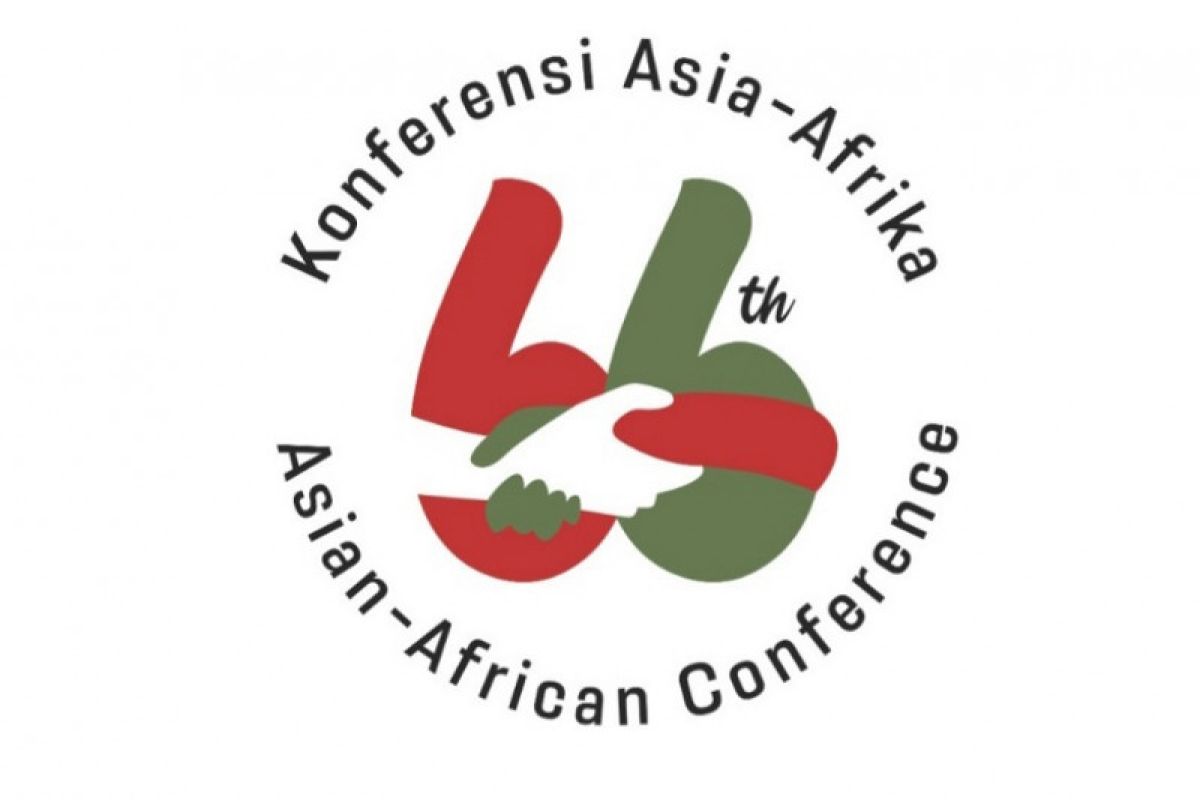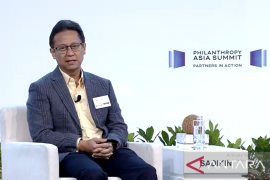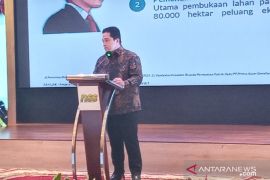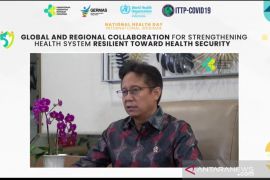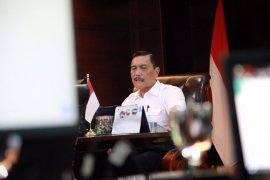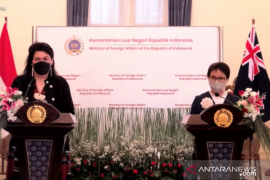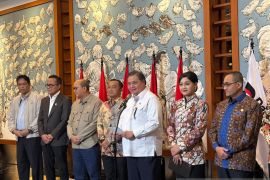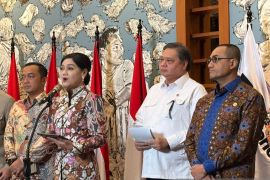The gap between developed and developing countries is getting bigger, racial and cultural sentiments continue to fuel conflict, and the major powers are still using their power for their own interestsJakarta (ANTARA) - The Ministry of Foreign Affairs of the Republic of Indonesia has chosen ‘Humanity and Solidarity’ as the theme for the 66th anniversary of the Asia-Africa Conference this year.
The spirit of humanity and solidarity of Asian and African nations is reflected in the commemorative logo of the 66th anniversary celebrations, with the tightly entwined hands of the number 66 serving to impress the two continents to make efforts towards creating a better world, according to the ministry.
The red color in the logo represents Asia, while the green represents Africa, and the white background represents the rest of the world.
The symbolism of the logo is in accordance with the original purpose of the conference, which was to improve solidarity between Asian and African nations by increasing economic and cultural cooperation, as well as efforts to fight all forms of colonialism, imperialism, and racism, the ministry stated.
The Asia-Africa Conference also aims to promote human rights and advance world peace and international cooperation.
The similarity of fate and the spirit of solidarity that inspired the first Asia-Africa Conference 66 years ago have again become relevant now when countries around the world are in the middle of a test to unite in the collective struggle against the COVID-19 pandemic.
"If we look closely, there are many similarities between the conditions in 1955 and those we are facing today. The gap between developed and developing countries is getting bigger, racial and cultural sentiments continue to fuel conflict, and the major powers are still using their power for their own interests," director of multilateral cooperation at the Indonesian Ministry of Foreign Affairs, Febrian A. Ruddyard, told ANTARA.
The current gap between developed and developing countries is evident from the fact that some countries still have unequal access to COVID-19 vaccines, he pointed out.
Citing Indonesian Foreign Minister Retno Marsudi, Ruddyard said: "Nearly one in four people in high-income countries have been vaccinated, while in low-income countries, only one in 500 have been vaccinated."
Renewed Relevance
In view of such disparity, the government of Indonesia has expressed the hope that all member states of the Asia-Africa Conference can revive and maintain the relevance of the values of solidarity and humanity contained in the Ten Principles of Bandung (Dasasila Bandung), which was born out of the very first conference in 1955.
The 1955 conference agreed on ten points, which were later known as the Ten Principles of Bandung. They served as a political statement containing the basic principles embraced by Asian and African nations in an effort to advance world peace and international cooperation.
"Basically, Indonesia encourages all Asian and African countries to reflect back on the 10 Principles of Bandung and its relevance in respecting human rights, the sovereignty of all nations, and world peace," said Ruddyard.
He also emphasized that the Ten Principles of Bandung remain relevant today as a guide for relations between countries, especially countries in Asia and Africa, as well as for solving global problems of common interest, including the fight against the global pandemic.
"As the Minister of Foreign Affairs (Retno Marsudi) repeatedly emphasized, no one is completely safe (from COVID-19) until everyone is safe," he remarked.
Such a view is indeed in line with the 10 Principles of Bandung, which emphasize the values of humanity, equality, and common interests, he said.
Furthermore, given the current global conditions, where people are very interconnected and tend to depend on this interconnectivity, the problem of handling the global pandemic cannot be viewed as a compartmentalized issue in each country, he added.
This interconnectivity is most easily seen from an economic point of view. For instance, although a country can successfully control the economy and restore its productivity, the success of that country will be meaningless if other countries that are its markets have not been able to absorb its productivity, Ruddyard observed.
This much is evident that in facing the global pandemic, the interests of all countries and nations are equal, he said.
"In this pandemic, we are all equal ... everyone is facing the same enemy. Therefore, it must be ensured that everyone has the same ability to face this common enemy," Ruddyard remarked.
In the wake of the global pandemic, which has proved the biggest humanitarian problem of this century, solidarity, multilateralism in vaccines, as well as equal access to safe and affordable COVID-19 vaccines are principles that have always been upheld by Indonesia, he said.
Those principles are also in line with the spirit of the Ten Principles of Bandung, he noted.
Furthermore, in order to ensure all countries are able to face their common enemy, COVID-19, each country must certainly get equal opportunity to gain access to vaccines, regardless of its economic condition, he said.
Platform for equality
Therefore, the Asia-Africa Conference needs to be used as a platform to promote equal access to COVID-19 vaccines, an Indonesian international relations expert has pointed out.
"The Asia-Africa Conference should be revived so that it can be used as a platform or a forum to promote the position of developing countries demanding equal rights of access to vaccines," Dinna Prapto Raharja from Synergy Policies told ANTARA here on Friday.
The Asia-Africa Conference as a forum is unique because its ideology recognizes the equal rights of nations, "instead of about who can pay how much, or who wants to follow whom”, she said.
Therefore, she argued, the conference can also be a forum for countries to make a joint effort to deal with the COVID-19 pandemic synergistically.
She also emphasized that the Asia-Africa Conference serves as a reminder that in conditions of adversity, developing countries need to revert to solidarity as fellow countries who want peace and respect for human dignity, respect for state sovereignty, and equality of all nations.
Hence, the spirit of the Ten Principles of Bandung needs to be re-appointed, Raharja said.
"So that in a situation of distress due to the COVID-19 pandemic and globalization, which turns out to not fully humanize nations fairly, the spirit of Dasasila Bandung may guide countries not to prioritize short and narrow interests and go their separate ways," she remarked.
At the GAVI-COVAX Facility meeting that was held online on April 15, 2021, Indonesian Foreign Minister Retno Marsudi also strongly argued against vaccine hoarding, nationalism, and politicization of vaccine distribution efforts.
Marsudi has repeatedly urged all countries to unite against vaccine hoarding and nationalism. In addition, she has stressed that vaccine politicization must also be eliminated since it has the potential to create geopolitical divisions.
She is currently one of the co-chairs of the COVAX Advance Market Commitment Engagement Group, a forum that brings together developing countries and donor countries to discuss the procurement and distribution of COVID-19 vaccines for developing countries.
The initiative taken by the Indonesian government is in accordance with the spirit of the Asia-Africa Conference and the Ten Principles of Bandung, particularly the third principle.
The third principle of Dasasila Bandung emphasizes the importance of "recognition of the equality of all races and of the equality of all nations large and small", which is very relevant to the issue of equal access to COVID-19 vaccines.
Ahead of the 66th commemoration With the Asia-Africa Conference, which will be held on April 18 this year, taking place in the midst of pandemic efforts, it is time for all member countries of the conference to direct themselves to revive the spirit of humanity and solidarity mandated in the Ten Principles of Bandung, Ruddyard said.
Related news: Asia-Africa Conference must push vaccine equity: expert
Related news: Indonesia offers to become vaccine hub for Southeast Asia : FM
Editor: Gusti Nur Cahya Aryani
Copyright © ANTARA 2021
